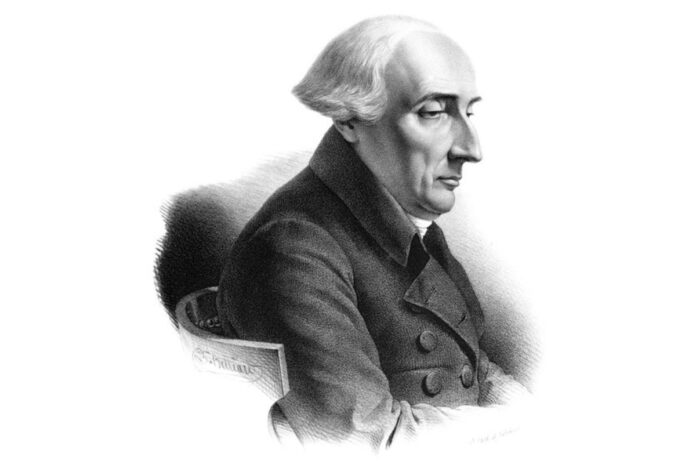Joseph-Louis Lagrange (born Giuseppe Luigi Lagrangia or Giuseppe Ludovico De la Grange Tournier; 25 January 1736 – 10 April 1813) was an Italian mathematician, physicist, and astronomer who later became a naturalized French citizen. He made significant contributions to various fields, including analysis, number theory, and both classical and celestial mechanics. Lagrange is widely regarded for his work in mathematics and science, particularly for his development of the Lagrangian mechanics framework, which remains a fundamental part of physics today.
Introduction: The Legacy of Joseph-Louis Lagrange
Joseph-Louis Lagrange was a titan of mathematics and physics, whose work has left an indelible mark on the scientific world. His contributions span numerous fields, from mechanics to number theory, and continue to shape our understanding of the universe today. But who was this brilliant mind, and how did his ideas help lay the groundwork for modern science? In this article, we’ll take a deep dive into the life and legacy of Joseph-Louis Lagrange, exploring his most notable achievements and the ways in which he revolutionized science.
The Early Life of Joseph-Louis Lagrange
Born in Turin, Italy, in 1736, Joseph-Louis Lagrange showed early promise in mathematics, displaying an exceptional aptitude for the subject from a young age. His parents, originally from a noble family, nurtured his intellectual development, though they had hoped he would pursue a career in law. Lagrange, however, had other plans.
Lagrange’s passion for mathematics led him to the prestigious Royal Academy of Sciences in Berlin, where he became a key figure in the mathematical community. It was here that Lagrange’s career took off, as he began to build his reputation as one of the leading mathematical minds of his time.
Lagrange’s Contributions to Mathematics
Joseph-Louis Lagrange’s influence on mathematics is immense. His work reshaped many areas of the field, including calculus, algebra, and number theory.
Lagrangian Mechanics: A Game-Changer for Physics
Perhaps his most famous contribution is Lagrangian mechanics. This reformulation of classical mechanics, presented in his work Mécanique analytique (1788), replaced the traditional Newtonian framework with a more elegant, generalized approach. By focusing on energy rather than forces, Lagrange’s method made it easier to solve complex mechanical problems, particularly in systems with many degrees of freedom. This laid the foundation for much of modern physics, influencing everything from orbital mechanics to quantum mechanics.
The Lagrange Multiplier Method: Optimizing Solutions
Another significant mathematical tool introduced by Lagrange is the Lagrange multiplier, a method for finding the local maxima and minima of functions subject to constraints. This technique is widely used today in optimization problems, ranging from economics to engineering.
Lagrange’s Theorem in Group Theory
In the world of abstract algebra, Lagrange’s Theorem in group theory provides a crucial result for understanding finite groups. The theorem states that the order of any subgroup of a finite group divides the order of the group itself. This simple yet profound concept has become a cornerstone in modern algebra.
Lagrange and Physics: Uniting Mathematics and Science
While Lagrange is often remembered as a mathematician, his impact on physics is equally monumental. His Lagrangian mechanics provided a new lens through which to view physical laws, unifying disparate branches of classical physics into a coherent framework.
Lagrange’s work on celestial mechanics, in particular, contributed to our understanding of planetary motion. His equations helped explain the orbits of planets, contributing to a broader understanding of gravitational forces, which were later refined by figures such as Newton and Einstein.
Joseph-Louis Lagrange: An International Influence
Lagrange’s genius extended beyond France, where he spent much of his later years. Though he was born in Italy, his scientific journey took him to Berlin, and eventually to Paris, where he became a French citizen and played a pivotal role in the scientific community. As a member of the French Academy of Sciences, Lagrange was instrumental in promoting scientific advancements in Europe.
Lagrange’s international impact can also be seen in his contributions to education. He mentored many prominent scientists, helping to develop the next generation of mathematicians and physicists.
How Lagrange’s Work Continues to Influence Modern Science
The Lagrangian framework remains a foundational concept in modern physics, especially in fields like quantum mechanics and relativity. The principle of least action, central to Lagrangian mechanics, plays a crucial role in modern theoretical physics, including in the development of Einstein’s theory of general relativity.
Lagrange’s methods are also pivotal in engineering, particularly in the study of systems with constraints, from mechanical systems to electrical circuits. His work remains a key part of university curricula around the world, proving the enduring relevance of his ideas.
FAQs About Joseph-Louis Lagrange
1. What is Lagrangian mechanics?
Lagrangian mechanics is a reformulation of classical mechanics that focuses on energy, rather than forces, to describe the motion of systems. It is a more general and powerful method used in physics and engineering.
2. How did Lagrange contribute to number theory?
Lagrange made significant contributions to number theory, particularly with his four-square theorem, which states that every natural number can be represented as the sum of four square numbers.
3. Why is the Lagrange multiplier important?
The Lagrange multiplier method is an essential tool in optimization, allowing for the calculation of maximum or minimum values of a function subject to constraints.
4. What is Lagrange’s impact on modern physics?
Lagrange’s principles of mechanics have influenced modern physics significantly, particularly in fields like quantum mechanics, celestial mechanics, and general relativity.
Wrapping Up: Joseph-Louis Lagrange’s Enduring Legacy
Additionally, Joseph-Louis Lagrange was a visionary whose ideas continue to shape the world of science and mathematics. From his reformulation of mechanics to his insights into number theory and optimization, Lagrange’s contributions are a testament to his genius. His legacy lives on in the tools and theories that form the backbone of modern physics and mathematics. The next time you study classical mechanics or solve an optimization problem, you’ll be standing on the shoulders of this extraordinary pioneer.




